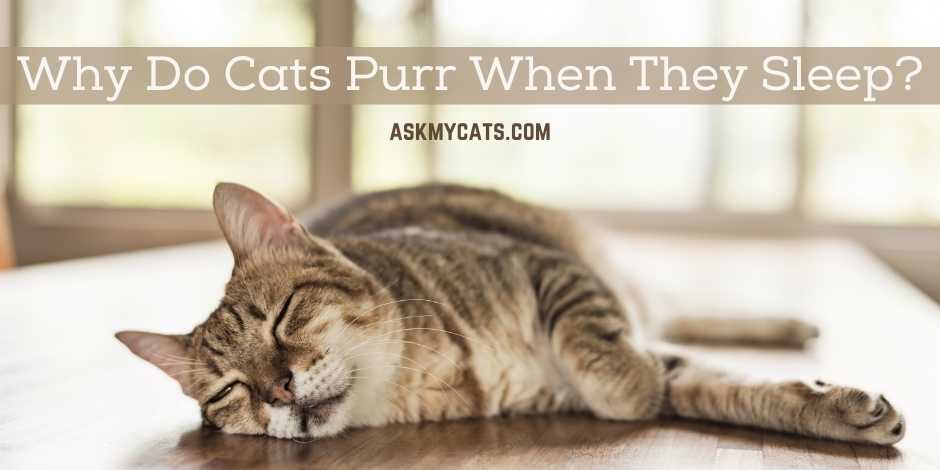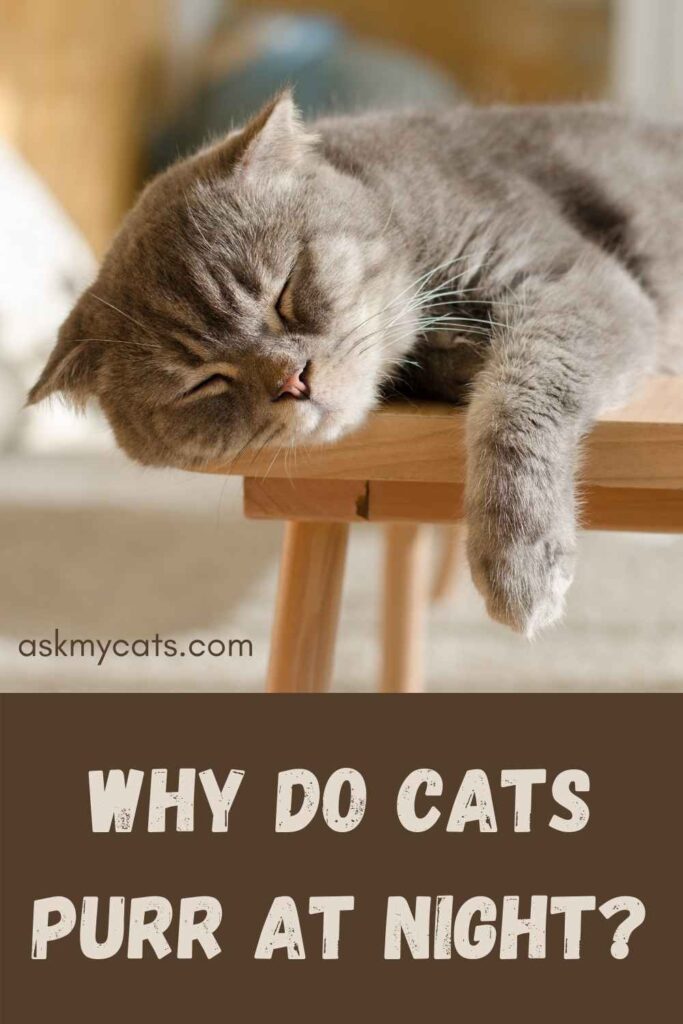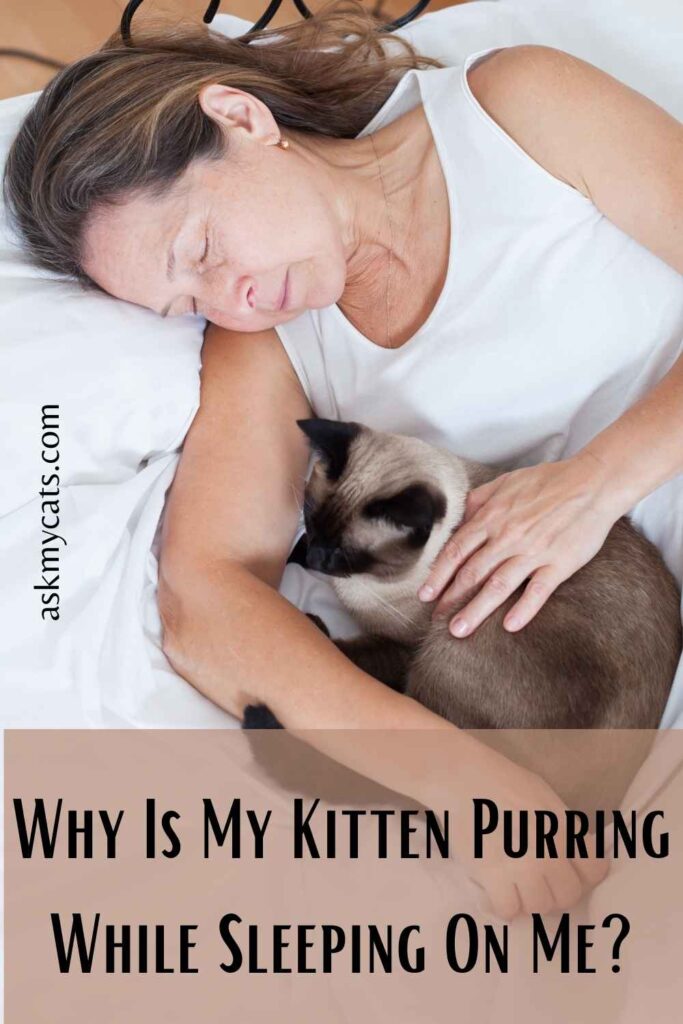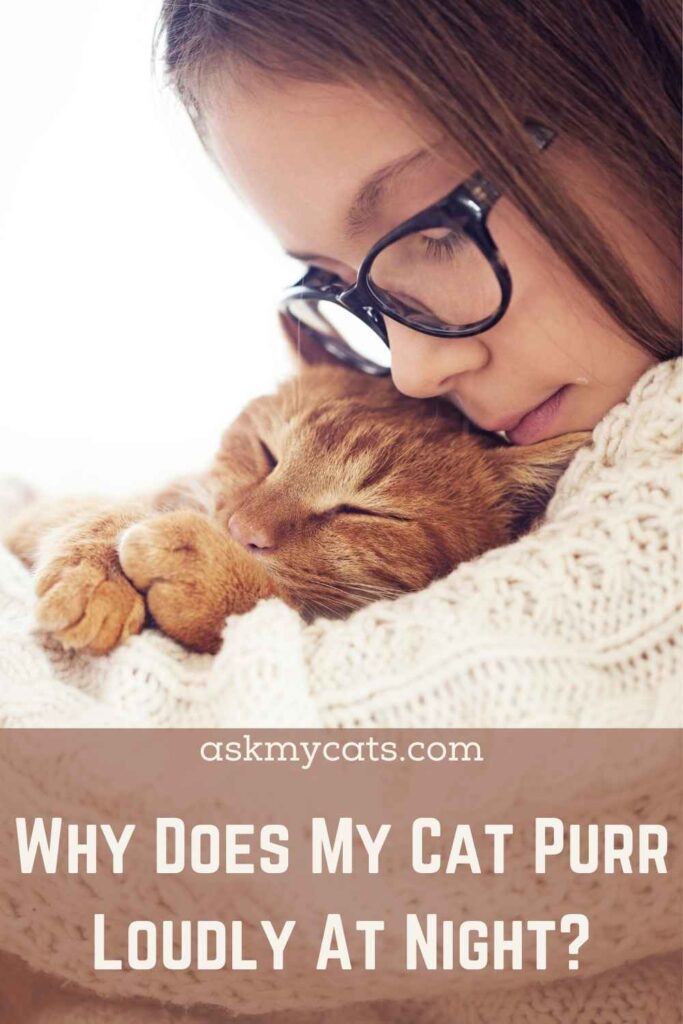Cats purr for a variety of reasons, including happiness, comfort, and even fear, but they do it on purpose. They occasionally do while they’re in a very light slumber, but not when they’re in a profound sleep perhaps if they’re dreaming about something good, but we’ve never witnessed it.
Cats purr to express a variety of feelings, not only contentment and relaxation. As a result, a cat may purr while sleeping if she is having a pleasant or horrible dream. She may purr out her tension or worry in the case of terrible nightmares.
We all know that the devil is in the details! So without wasting any more time, let’s jump to the conclusions that we have made and simplified for you!
Key Takeaways
- Cats occasionally purr while they are in a light sleep, but not when they are in a deep sleep.
- Cats may purr while sleeping if they are having a pleasant or horrible dream.
- Purring is a way for a cat to show that it is comfortable and content enough to sleep peacefully.


Give Your Cat the Perfect Day
Get the Free Ebook!
Why Do Cats Purr At Night?
Cats are purring at night because they’re having a dream! When they reach the REM (rapid eye movement) stage of sleep, cats may experience dreams that they express by purring.

However, just because you’re purring doesn’t imply your dreams are good. Purring is a way for a cat to show that it is comfortable and content enough to sleep peacefully.
This is especially true if they sleep in a ‘belly-up’ position (exposing their sensitive underside while not awake), or if they lie on their side with their legs spread out.
Ill or injured cats may do the same thing as people who need to ‘sleep off’ a problem or who are weary due to illness or injury.
Snoring is common in cats, particularly those with flatter faces, those who are overweight, or those that sleep in certain positions.
Snoring can also be caused by chronic nasal floor issues. Is snoring a sign of something wrong? If your cat snores frequently, it’s usually nothing to worry about.
If snoring is accompanied by drainage from the eyes and nose, however, it’s time to see a veterinarian.
Cats are nocturnal species in their native environments. They snooze for practically the whole day and then play or hunt at night. There are several reasons why your cat could wake you up in the middle of the night.
It’s possible that it’s not getting enough stimulation, enrichment, or exercise during its active times, so when you’re drifting off, your cat is wide awake and ready to play.
If your cat spends the majority of its active time alone at home while you’re at work or elsewhere, it’s possible that it’s boring and searching for company.
Your cat is hungry, thirsty, or desires a late-night snack or special treat. Your cat’s routine is no longer in line with yours. The bedding or litter pan of your cat has been disrupted.
If your cat is older and/or his or her nightly friskiness is new or uncommon, take note. Check with your veterinarian as soon if your cat exhibits unusual behavior, wakes up at night for no apparent reason, appears unwell, or displays other indications of illness.
Interrupted sleep patterns might indicate a variety of illnesses, ranging from a toothache to something more serious like arthritis, hyperthyroidism, or high blood pressure.
You may use a variety of ways to teach (or retrain) your cat not to keep you up at night. Some will necessitate some behavioral adjustments on the part of the pet owner, so make sure that everyone in the household is on board with the changes.
Decide how you’ll react to your cat before you go to bed. Making a choice in the middle of the night is not a good idea.
If a loud or irritating cat wakes you up, try to establish a quiet atmosphere so that you (and your cat) can enjoy some restorative sleep.
Make sure that everyone in your household is aware of what you’re doing. If you neglect your cat but someone else feeds it in the middle of the night, you’ve wasted your time.
If you have many cats, the purring might be for a more charming cause. Purring is a comforting and bonding behavior for cats lying together, such as a mother cat and her kittens. The purring sound alone may aid in physical healing.
Must Read: Cat Purring Effect On Humans: The Power of Cat Purring
| Study | Result |
|---|---|
| Study 1 | Cats may purr while they are sleeping as a way of self-soothing and calming themselves down. |
| Study 2 | Cats may also purr when they are in a deep state of relaxation, such as when they are sleeping. |
| Study 3 | It is not uncommon for cats to purr while they are sleeping, as it may be a way of expressing emotions or seeking attention from their owners. |
| Study 4 | Some cats may purr when they are in a state of REM sleep, which is a deep stage of sleep associated with dreaming. |
Why Is My Kitten Purring While Sleeping On Me?
When the cat lays on you, purrs, and falls asleep, he is demonstrating that he not only trusts you to do no harm but that he really enjoys being around you, as seen by this gesture.

Cats purr for two reasons in general. The first is that it helps them feel better since they are comfortable and safe. The other is to assist children to manage when they are in pain or other discomforts.
Purring has been demonstrated to have therapeutic benefits for both cats and their owners. The purring of a cat, for example, has been proven to speed up the healing of fractures.
Purring is thought to start in the brain, with a neural oscillator sending a signal to the cat’s larynx and breathing, which causes distinctive vibrations at the right frequency.
In the end, he loves you and is content, and he is expressing this and, very probably, attempting to assist you in some manner.
Purring is the most apparent and popular method for cats to express their joy and affection. When cats are comfortable and enjoying something they appear to have a unique tiny motor inside them that starts.
When you’re caressing your cat, you’ll frequently hear rumbling, vibrating sounds. Purrs can also indicate that your cat is angry, though this is less usual.
Bunting occurs when your cat rubs their cheeks on you or an item, forehead-butts you, or rubs its head on you.
It’s a method for your cat to establish his territory by leaving his scent on you. When cats are in love with something or someone, they do this. Bunting may be practiced on other pets or their favorite people.
We associate a cat purring with happiness and relaxation. Cats on the other hand purr when they are injured or giving birth as well as during other stressful situations.
What is the reason behind this? Purring is thought to be a means for cats to strengthen and mend their bodies, according to researchers.
The frequency range of a cat purr has been measured to be between 20 and 150 Hz. Vibration at such frequencies can aid in the healing of bones and tissue injury.
This not only speeds up recovery but also strengthens muscles and reduces discomfort. Vibration therapy is really used to help humans heal faster from injuries and even treat diseases like arthritis.
Increased musculoskeletal system pressure boosts bone density. This is why astronauts who stay in space for long periods of time lose bone mass.
Purring comes from deep within the diaphragm in cats. Their entire body begins to vibrate lightly as a result of this. This vibration, according to scientists, primes the body to regenerate healthy cells and maintain good tissues healthy.
Also, check out why my cat sleeps between my legs
Why Does My Cat Purr Loudly At Night?
Your cat is most likely purring loudly in its sleep because it is in a relaxed state or in its comfort zone.
Cats purr when they are joyful or when they need to be comforted. It’s also conceivable that your cat is dreaming. While sleeping, some cats snore, which might be mistaken for purring.
If your cat is purring in their sleep, it’s safe to assume they’re at ease, whether they’re curled at your feet or snuggled in its bed.
While cats can purr when they are anxious, this is unlikely if they are comfortable enough to snooze and have no known health issues that are causing them discomfort.

1. Finding Comfort
I’d suppose that a cat purring in its sleep is relaxed without knowing anything else about the situation.
After all, they’re relaxed enough to nap, which indicates they’re unlikely to be stressed or injured, two things that might otherwise keep them awake.
It’s also conceivable that your cat isn’t sleeping and you’re simply imagining it.
While in my lap, my cat regularly shuts his eyes and purrs, but he is not sleeping—just extremely comfortable.
When attempting to evaluate your cat’s mood, you should consider additional factors such as environmental stresses or whether they have a known disease that may be causing them discomfort.
“Cats may purr when they are sleeping as a way of self-soothing and calming themselves down. The rhythmic vibrations of cat purring can help to relax the body and mind, which may improve sleep quality and make it easier for cats to fall asleep.”
Dr. Rachel Barrack, DVM, CVA
Also, check out why my cat makes noises when he sleeps
2. Dreamer Kitty
Although your cat is most likely content when purring in their sleep, there is a more intriguing—and slightly more complicated—a reason for their purring.
When we dream, we enter the REM (rapid eye movement) stage of sleep. Scientists still have many unresolved issues regarding sleep, and we don’t fully understand why REM and dreaming—or even sleep—is so crucial.
However, it appears that they are essential to more than just humans. Dreaming happens to all mammals when they sleep, therefore it’s something we share with a lot of animals, including our cats.
We’ll never know what our cats are dreaming about, of course. When they purr in their sleep, it’s very conceivable that they’re experiencing pleasant dreams. They might also be purring out of anxiousness as they fantasize about a trip to the veterinarian.
While we may wish we could know what was going on in their thoughts (I’d love to be able to read my cats’ minds!), we can’t.
3. Might Be A Snore!
If you’re not sure what sounds your cat is making, examine if they’re snoring or purring.
Snoring is a common occurrence in cats, and it doesn’t always indicate that something is amiss. It also doesn’t necessarily imply that they’re any less calm than a sleeping cat!
Snoring is more common in cats with flatter faces (short muzzles) and those that are overweight. Cats are prone to snoring in certain sleeping postures.
It’s probably nothing to be concerned about if your cat snores frequently. However, if your cat has started snoring or is snoring with discharge from its nose or eyes, you should take them to the veterinarian right once.
These signs and symptoms might point to upper respiratory issues or other diseases.
Furthermore, if your snoring cat has difficulties breathing when awake, this is quite concerning, and you should arrange an appointment with your veterinarian right away.
Any rapid changes in behavior, as always, might suggest medical issues, so if you’re concerned, it’s better to be careful and get medical advice.
Cats are good at hiding discomfort and sickness, so pay attention to any symptoms they do display. They can mean the difference between your cat catching an illness early or suffering for a long time.
Use a humidifier to wet the air, and make sure your cat gets a nutritious diet and daily exercise to treat snoring at home (if your cat has always snored, or in addition to consulting with your veterinarian).
Interesting Read: Why Does My Cat Lay On Me And Purr?
The Effects of Cat Purring on Sleep
| Effect | Explanation |
|---|---|
| Helps cats fall asleep | The soothing vibrations of cat purring can help cats to relax and feel calmer, which may make it easier for them to fall asleep. |
| Improves sleep quality | Cat purring has been shown to have a number of positive effects on human sleep, including reducing stress and anxiety levels and improving sleep quality. |
| Promotes relaxation | The rhythmic vibrations of cat purring can help to relax the body and mind, making it easier to fall asleep. |
Do Housecats Only Purr?
Purring isn’t exclusive to housecats, and it’s probable that cats have been using the sound for a long time.
Cheetahs, bobcats, pumas, and other cats purr in the same manner as the cat that is currently sitting on your lap purrs. Other large cats, such as lions, emit a sound that resembles purring but differs from what we think of as purring in housecats.
When it comes to cats and purring, there’s still a lot to discover and research, and it’s probable that we’ll continue to learn more about its roles as science progresses in the future.
Some of the Interesting reads regarding cat purring:
- Why Do Cats Purr? The Science of Cat Purring
- Why Doesn’t My Cat Purr?
- How To Make A Cat Purr?
- Why Do Cats Purr When They Are Dying?
- Do Cats Purr When They Sleep?
- Why Does My Cat Purr When He Sees Me?
- Why Is My Cat Purring So Much?
- Differences In Purring Between Cat Breeds
- Why Do Cats Purr When You Stroke Them?
- Can Cats Control Their Purring?
- Why Do Cats Purr When You Talk To Them?
- Do Cats Purr When They Are Happy?
- Do Cats Breathe Faster When Purring?
- Why Do Cats Wag Their Tails While Purring?
- Why Does My Cat’s Purring Sound Congested?
- How To Purr Like A Cat?
- Why Do Cat’s Noses Get Wet When They Purr?
- Why Is My Pregnant Cat Purring So Much?
- Why Do Cats Purr And Knead?
- Do Cats Purr When They Are Sick Or In Pain?
- Do Feral Cats Purr?
Frequently Asked Questions
Why do cats like to sleep with their owners?
Because they are vulnerable at night, many cats prefer to sleep with their owners. They were vulnerable to larger creatures in the wild, so they sought shelter and safety. It’s not unexpected that people want to sleep with you since they feel comfortable and secure in your company.
Why do cats purr when they see you?
When cats are in a peaceful atmosphere, they will purr, sending off waves of tranquility. This can also happen when you brush them, indicating that your feline companion is pleased or friendly. Cats, on the other hand, purr to express a variety of emotions and wants.
Do cats purr when they are happy?
The obvious observation is that cats purr when they are happy and content. However, this isn’t always the case: some cats purr when they’re hungry, hurt, or scared. Surprisingly, purring frequencies have been found to promote bone regeneration—right, that’s bone regeneration.
Final Words
The soft palate can relax when cats are in a deep slumber and totally relaxed, leading the cat to emit tiny snore-like noises. It’s nothing to be concerned about; instead, it indicates that your cat is sound asleep.
Every cat is different; some will never purr, while others will purr continuously. They also use it to keep the weak-minded humans they dwell with under control.
Okay, maybe “weak-minded” is a harsh phrase, but cats know how to take advantage of a natural inclination that we all have.
Feel free to drop your questions in the comments section below!
Interesting Read: Why Does My Cat Drool When He Purrs?
Interesting Read: Why Does My Cat Purr And Bite Me?
